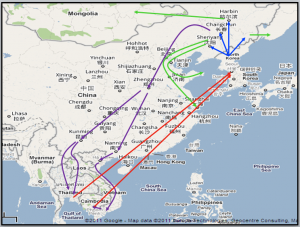Memo #229
By Jiyoung Song – jysong [at] smu.edu.sg
 Just imagine you’re a North Korean living in a small village. You have no one to compare your condition with. One day, you hear about people who’ve fled to China who are now well off. Some even go to South Korea, a place you know about from smuggled DVDs. You know that if caught, you could be sent to prison and beaten by guards. If successful, such migration promises a better life.
Just imagine you’re a North Korean living in a small village. You have no one to compare your condition with. One day, you hear about people who’ve fled to China who are now well off. Some even go to South Korea, a place you know about from smuggled DVDs. You know that if caught, you could be sent to prison and beaten by guards. If successful, such migration promises a better life.
In most North Korean migration cases, negative push factors such as absence of political freedom and economic opportunities in North Korea combine with positive pull factors in China of food, temporary shelter by NGOs and Christian missionaries, chances to go to South Korea and refugee status. These push and pull factors, together with factors that facilitate irregular migration, form a self-organizing complex adaptive system, analogous to osmosis in biochemistry. Unlike molecules, however, humans have conscience, norms and identities.
Over 2,000 North Koreans have been arriving in South Korea every year since 2006, with 70% being female. Most use China-Southeast Asia routes, operated by transnational smuggling networks. Thailand serves as the main transit country, although the Philippines, Vietnam, Cambodia and Myanmar are also used. The boundaries between human trafficking, people smuggling and the flight of refugees are blurred. For example, a North Korean woman I interviewed in Bangkok had been sold as a bride to a Chinese farmer. She later paid a group of Korean-Chinese smugglers to move her to Thailand. In Bangkok, she claimed refugee status. Her story of transformation is not unique: the identities of North Korean women migrants shift along their journey.
Contributing to the complex picture are political tensions and trade relations among the countries involved, as well as the involvement of NGOs and missionaries. Still, the key actors are North Koreans themselves. In contrast to the passive victimized image of North Korean defectors, such migrants are increasingly informed, adaptive and resilient.
The complexity of North Korean migration cannot be explained by the linear conceptual frameworks generally used in the field of migration or international relations. Network theory, complex adaptive systems, self-organization or emergence in complexity theory offer better theoretical frameworks and methodological tools for studying irregular migration.
About the Author:
Song Jiyoung is an Assistant Professor of Political Science at the School of Social Sciences of the Singapore Management University. Her current book project focuses on the nexus between irregular migration and human security in East Asia, using complexity theory.

Migratory routes taken by North Koreans on their way to South Korea. Map modified by the author © Song Jiyoung.
Links:
- “Smuggled Refugees”: The Social Construction of North Korean Migration, International Migration, 2013, (by Song, Jiyoung)
- Signals and Boundaries: Building Blocks for Complex Adaptive Systems (Cambridge MA: MIT Press, 2012)
- North Korea Refugees Foundation (Korean Only)
- OhMyNews, 23 August 2012 (Korean Only)
- Statistics Korea (Korean Only)
Related Memos:
- See our other memos on North Korea
Comments are closed, but trackbacks and pingbacks are open.